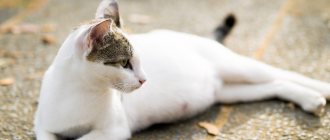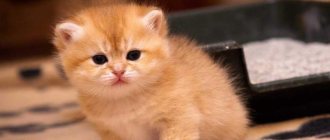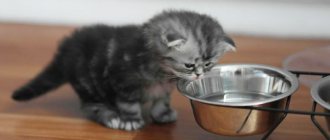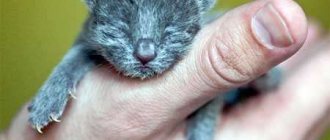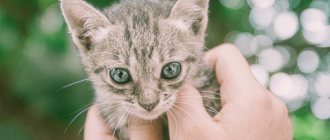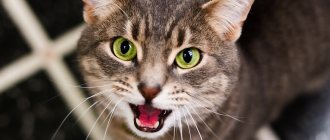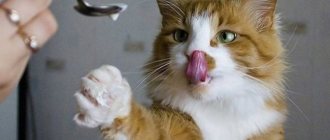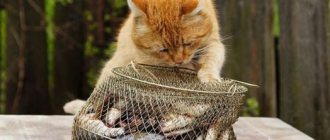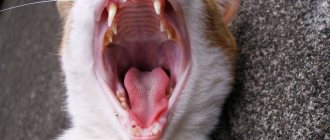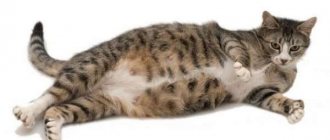9710Administration
Usually, a furry baby that appears in the house develops quickly, which certainly pleases its owners. But quite often it happens that it does not reach the required size at a certain age. An attentive owner will immediately notice this and think about why the kitten is not growing and how to fix it.
In this situation, only a veterinarian can give a complete, and most importantly, correct answer after an individual examination of the animal. After all, the topic of poor growth of pets is relevant and requires certain knowledge to correct the situation.
© shutterstock
Stress
If the baby was taken away from his mother cat and the fluffy ball moved to another house, he may experience stress. He is frightened by unusual surroundings, loud sounds, and foreign smells. Stress can sometimes cause stunted growth and weight. You should create a calm, comfortable environment for the kitten and, under no circumstances, wake him up during sleep. After all, it is during sleep that the active growth of a small organism occurs. You should observe the kitten's behavior. Maybe something is bothering him, and the baby looks sad, is not interested in toys, and is not eating well. In this case, you need to consult a veterinarian.
Treatment
We have already answered the question: can rickets be cured?
It can be cured if diagnosed in time, but treatment must be comprehensive and long-term.
How to treat rickets:
- In the hospital:
- intravenous administration of medications to correct vitamin and mineral balance;
- ultraviolet irradiation with quartz lamps;
- according to indications: enzymes, cardiac medications.
- At home:
- Vitamin D is prescribed: fish oil, Ergocalciferol (vitamin D) solutions;
- intramuscular injections of the drug “Tetravit”, which contains ascorbic acid, vitamins F, E, D3;
- sunbathing;
- massage;
- increased motor activity of the kitten.
The success of treatment depends on strict adherence to all the veterinarian's prescriptions.
Nutrition for rickets
Particular attention should be paid to the diet of a sick kitten. His menu should include foods rich in vitamin D:
- beef liver;
- cottage cheese;
- cream;
- egg yolks;
- sour cream;
- sea fish: mackerel, chum salmon, herring, salmon, sardines, tuna.
Babies who have suffered from rickets in the first months of their life will subsequently require regular maintenance therapy and a special diet. To monitor the state of their development, it is necessary to donate blood annually for biochemistry.
Genetics
If a kitten does not gain weight for a long time, you need to inquire about the health of its parents. Perhaps he inherited miniature forms from one of them or this is a genetic deviation.
In any case, a newborn kitten or an already grown one, if it is not gaining weight, the pet should be examined at a veterinary clinic. An experienced specialist will conduct a diagnosis and, if necessary, provide qualified assistance.
Related articles: British kittens: care and maintenance How to make a toy for a cat Automatic cat toilet
What to do if the cat is not growing?
What should an owner do if he notices signs of slow growth or cessation in his pet? People who are interested in cats and their lives have probably heard more than once that kittens sometimes do not want to grow up. Indeed, cases where kittens grow very slowly or suddenly stop growing are not so rare.
For the development of a kitten and its growth, first of all, proper and balanced nutrition is important.
It must contain a sufficient amount of nutrients, as well as all the vitamins and minerals necessary for the growth and development of a young body.
It's no secret that animals - just like children - grow quite quickly.
If a kitten eats dry food, it must not only be of high quality, but also be selected in such a way as to match the age of the animal and meet the needs of the growing body. Otherwise, if a kitten eats food designed for adult animals, it may face a lack of certain substances important for its body, which may ultimately result in growth retardation.
Fortunately, you don’t have to be particularly smart in this regard: in any more or less decent pet store you can find high-quality food designed for kittens of various ages. There are even options for such food that are intended for kittens of a particular breed or, for example, food for playful kittens.
In addition, a young male cat must be fed with special vitamin supplements that were developed for animals of this age.
These supplements can also be purchased at any pet store.
If the kitten eats homemade food, the owner must ensure that the kitten receives a sufficient amount of proteins, fats and carbohydrates.
The problem is that most homemade food (unless it is specially prepared with a cat's needs in mind) contains too many carbohydrates even from the point of view of the human body, let alone a cat. Likewise, there is too much fat. At the same time, the amount of protein, which is the most important nutrient for a cat, is, on the contrary, too small. Not just not enough, but many times less than the required minimum.
If you take a kitten into your home, be prepared for the fact that in just a couple of months it will noticeably get stronger and grow.
Therefore, if a kitten eats regular food from the table, and does not receive any additional feeding that at least meets its protein needs, it will probably grow much smaller than it could.
The main part of the diet of a kitten that eats natural products should be meat.
In addition, the kitten should be given a small amount of grains and fiber. To relieve a kitten from a lack of vitamins and minerals, it is recommended to add fish oil to its food, which has an extremely beneficial effect on both the growth and overall development of the young body. However, it is worth noting that fish oil cannot be given constantly, since this negatively affects the condition of the animal’s liver. Therefore, such vitamin supplementation should be carried out in courses.
It is best if a kitten who is not yet 3 months old has access to food continuously throughout the day.
The next factor that affects a cat's growth rate is parasites. First of all, these are worms. Regardless of what age the cat is, from time to time it should be given anthelmintic drugs, which can also be purchased at any pet store or veterinary pharmacy.
If the owner neglects deworming, the cat may be very stunted in growth, since a significant part of the nutrients received from food will be spent on “maintenance” of parasites. It is advisable to poison worms two to four times a year, having previously selected a suitable drug in a pet store or veterinary pharmacy, calculating the required amount of the drug according to the weight of the animal.
For preventive purposes, and to accelerate growth, the cat must be given preparations containing calcium.
Such a mineral supplement should also be selected in accordance with the age of the animal and its weight. For this reason, such drugs should be selected in specialized stores for animals, where everything is already calculated and selected for animals of various ages and weights.
If the cat does not want to grow even after taking all the measures described above, then most likely the cause is not a lack of minerals or vitamins, but a hormonal imbalance. Often, a cat can stop growing for several months, and then suddenly begins to grow and get better very quickly.
There are even cases where stunted cats even become mothers. In such cases, the growth of the animal stops forever. In order not to rack your brains over what the fate of an animal that is stunted in its growth will be, it would be best to take your pet to a veterinarian who can carefully study the problem, or recommend special treatment if such a need arises.
If you find an error, please select a piece of text and press Ctrl+Enter.
Causes of delayed development
Why a cat is not growing is a serious question that must be resolved based on the well-being of the pet, its age and genetic indicators of the species. Growth problems in a baby may arise due to similar abnormalities in the parents. If the baby’s father or mother is not of decent size, then he could inherit this feature at the genetic level. These kids grow much slower than their peers, but at the same time they play actively and eat a lot.
Another problem that can explain what is happening is the presence of worms in the kitten. These parasites negatively affect the animal's body, preventing it from developing normally. As a result, the baby grows extremely slowly, and his immune system is always under threat.
Why doesn't the kitten that was the smallest in the litter grow? Here we can talk about insufficient nutrition from the first days of life. Those babies who are the weakest in the litter usually receive little milk. As a result, their stomach is narrowed, and in the future, even with a normal diet, the pet will consume very little food. Poor appetite will lead to the fact that the kitten will develop very slowly, and various diseases will overcome it on a regular basis.
It is difficult to make a diagnosis on your own, but you should not ignore the problem. The veterinarian will be able to assess the situation and find out why the kitten is growing so slowly.
Sometimes growth problems occur in a kitten due to problems with the digestive system. In such a situation, the cat eats a lot and consistently, but the food is poorly digested, and slow digestion negatively affects natural growth.
Malnutrition
One of the most common reasons why a kitten is not growing or gaining weight is a lack of food. The smallest babies may simply not have enough mother's milk. In this case, you will have to feed the kittens manually. At an older age, the kitten does not grow due to the too meager rations that it receives. Normally, a one and a half month old baby is fed up to 5 times a day. At this age, his stomach is small and cannot accommodate large volumes, so he is fed often, in small portions.
From newborn to full member of feline society
Newborns weigh only 100 g. For the first 10 days they rely completely on their mother, as their senses are just beginning to develop.
Kittens are born blind, deaf and toothless. Their only reference point in space is their developed sense of smell. With its help, they can easily find mother's nipples located within 60 cm.
It takes a lot of time to develop into a full-fledged member of cat society. Each stage of growing up is unique and full of challenges, so try to give your pets all the support they need.
Eye opening
The eyes open 10-14 days after birth. The exact time depends on gender and coat length. Girls with short hair always mature earlier than boys with long hair.
Please note that all newborns have blue irises. With age, its color may change.
Teething
Milk teeth erupt on days 21-28, and after another 2 months their place is gradually taken by molars. By this point, the pets have already left the “nest”, and all poorly lying objects suffer from their new teeth.
Standing up and walking
Along with vision comes hearing. Thanks to new sensations, the world around us becomes more and more interesting.
Out of curiosity, kittens crawling on their tummy begin to make their first attempts to stand on their paws. At 3 weeks of life, they are already trying to walk, but they do it very clumsily and often fall. Their coordination improves by about 1 month.
First taste of adult food
Complementary foods are given at 1-1.5 months, when the cat’s breast milk supply begins to decrease. All food served is thoroughly boiled and crushed, achieving a liquid consistency. Solid foods are introduced into the diet only after all baby teeth have appeared.
When to give the baby to new owners?
Acquaintance with a new family should be done at 2.5-3 months. By this point, the diet of kittens is no longer different from that of an adult, so they cope much more easily with separation from their mother. This age is also optimal for vaccinations that provide immunity against the most common viruses.
New owners will have to go through 2 more stages with their mustachioed pets on the way to growing up: the first molt and puberty. After this, the active growth phase ends, and the animals are equated to adults.
Worm infestation
Worms can also lead to weight loss. In this case, the kitten does not grow or gain weight due to the fact that the parasites suck out all the nutrients from the food, leaving nothing for its owner. A characteristic sign of helminthic infestation is the animal’s good appetite with low body weight gain. The kitten is not growing or gaining weight, although it is eating well and its tummy feels firm to the touch. Constipation or diarrhea may occur. When examining stool, helminth eggs are found. How to deal with this disease is here.
